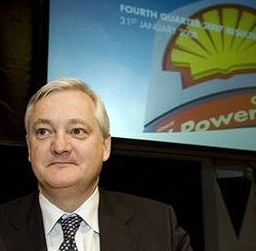Peter Voser Has A Gas Problem
 Pardon the title, but the Wall Street Journal has an extremely interesting interview with the top dog at Shell, Peter Voser.
Pardon the title, but the Wall Street Journal has an extremely interesting interview with the top dog at Shell, Peter Voser.
He admits that Shell is fast becoming a gas company rather than an oil company. “Shell started quite a while back, actually, to put a lot of emphasis on gas” says Voser. “And by 2012, we will have more gas production world-wide than we have oil.”
Peter is positively enthusiastic about gas, which he calls “a long-term source of energy that has a lot of positives.”
One of these positives for Peter is that he argues that gas has “50%, 70% less CO2 than coal, for example, and that’s exactly where we see the long-term benefit.”
The trouble with figures is that they can be meaningless.
Voser is right when he says that gas contains about 50 per cent less GHG when you burn it than coal. But let’s look at the emissions generated from production of the fuel. For oil, extraction and refining emissions are about 20% of the overall life-cycle emissons.
Independent figures on the amount of carbon per barrel of oil equivalent produced in production have gas producing only small amounts less carbon than oil.
According to HSBC, conventional gas produces 22 kg per boe, whereas conventional oil is 25 kg boe.
I know that there really is not a standard “conventional” oil or gas as there is a huge range of estimates for carbon intensity depending on geographical location, and difficulty getting it to market.
But much of Shell’s future gas supplies will be reliant on turning gas to liquid to get to market, as I pointed out yesterday about their new billion dollar bid into the Queensland coal bed methane market.
What we do know is that the carbon intensity of liquefied natural gas (LNG) is about three times worse than conventional oil, and on the par with the tar sands (75 kg/ boe).
So here is the rub- if Shell is going around and saying that gas is a clean bridging fuel, that it’s much cleaner than oil, depending on where this gas is coming from and how it gets shipped to market, gas may not be as clean as you think.
